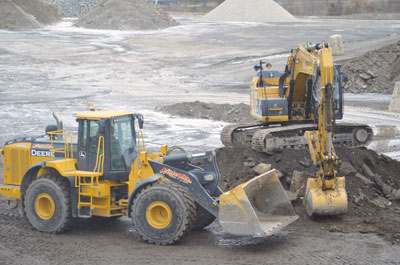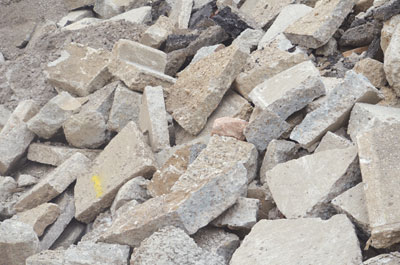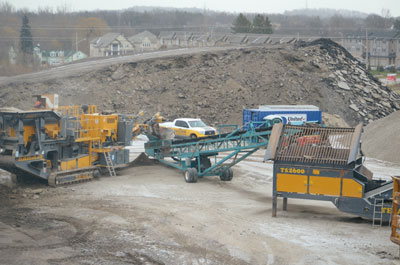
Features
Aggregates
Profiles
Recycling to Rebuild
Tackling the task of recycling municipal aggregate waste.
April 17, 2013 By Andrew Macklin
The City of Kitchener, Ont., is providing an excellent example of just how valuable recycled aggregates can be.
The City of Kitchener, Ont., is providing an excellent example of just how valuable recycled aggregates can be.
 |
|
| The wheel loader and excavator work in tandem to provide materials to be crushed and screened.
|
During the 2012 construction season, Kitchener accumulated all of its waste aggregate products from across its construction, demolition and renovation projects at a municipal yard in the west end of town. By the time the work was complete, the municipality found itself with 60,000 tonnes of material, separated into piles of concrete slabs, asphalt chunks, ripped up curb, and other types of aggregate materials taken away from job sites.
A tender was soon released by the City, looking for bids for crushing the recycled materials in order to provide aggregate resources in 2013 and beyond. In the end, Kieswetter Excavating won the contract to crush the recycled materials.
Kieswetter is no stranger to working with the City of Kitchener. Established in 1930 by John Keiswetter Sr., the Heidelberg, Ont.-based company has primarily operated in the region, providing excavation work for many major commercial and government sites in the region. Roger Kieswetter, the current owner, split the business in half in 2001, at which time he focused his operation on the excavation business. That also included the establishment of an environmental division, where the company collects and recycles a variety of building and construction materials through its roll-off bin service.
Because of its track record with the TESAB brand, Kieswetter Excavating has purchased several portable crushers for its operation. Those crushers are heavily involved as part of the environmental division of the company, helping to crush the recycled building and construction materials into A gravel, B gravel, and any other gravel and asphalt products needed by both Kieswetter and its customers.
Steve Kuret, who is the sales rep for TESAB Ontario responsible for some of those portable crusher sales, has been overseeing the work being done by Kieswetter at the City of Kitchener site.
“The project will take around two months to complete,” says Kuret. “The average daily production is around 1,000 tonnes crushed. The contract gives us 60 days of production with 60,000 tonnes of material produced.”
 |
|
| All of the City of Kitchener’s aggregate-based construction waste, including sabs of old sidewalks seen here, is brought to a central depot to be crushed and reused.
|
The climate was the primary challenge facing the crew in meeting their two-month deadline. The operation ran through January and February, which in southern Ontario, could mean anything from bitter cold and several feet of snow to temperatures above the freezing mark and lots of rain. But Kuret was confident that his company’s product was the right choice for the Kieswetter crew to battle such unpredictable weather conditions.
“The southern Ontario climate is definitely a challenge,” says Kuret. “But TESAB equipment is built to be versatile. Our equipment is sold and used in similar challenging climates like Russia, India and Australia.”
The machine at the centre of the project is a TESAB RK1012TS portable self-contained tracked impact crusher. The RK1012TS features a Caterpillar C13 Powerpack crusher engine, and includes a two-deck independent pre-screen with telescopic side belt.
On the job site in Kitchener, a two-man team operates the TESAB unit, which works alongside a Cat 320E excavator and a Deere 644K wheel loader. The wheel loader brings buckets of clean concrete and clean asphalt from the stacks over to where the crusher is set up. The excavator is then used to drop the larger chunks of concrete and asphalt into the TESAB unit, which then crushes the materials. A Rotocrusher unit is also used for secondary crushing, with both machines filtering materials into the TESAB TS2600 two-deck tracked screen. The TS2600 features a Cat C4.4 Tier III (130 hp) Powerpack engine with a 6,000 x 1500 mm (20 x 5 in.) Double Deck Screen.
Recycling Operations Growing
Being able to put a portable system in place, such as the one used by Kieswetter on the City of Kitchener site, has provided better flexibility for municipalities in using recycled materials. In the last few years, a wider acceptance of recycled asphalt and concrete by provincial and federal transportation officials has increased the number of municipalities now diverting used concrete and asphalt from the landfill back to the construction site.
 |
|
| The TESAB portable crusher and portable screen are processing 1,000 tonnes of recycled material per day on the Kitchener job site.
|
“The broader acceptance of recycled materials started a few years ago with the MTO allowing a percentage of recycled material back into an A gravel mix that can be used in road development,” says Kuret.
That broader acceptance was adopted early on by the City, which put recycled A gravel and B gravel back into municipal construction projects, such as access roads and curbing throughout the city of over 200,000. Renting the equipment and personnel to crush the recycled materials instead of purchasing virgin aggregates has also provided a significant cost savings for the municipality. That cost savings should be enough to drive municipalities towards greater use of the recycled materials.
With the emergence of portable crushing technology, recycling operations in municipalities has become a real option for both diverting construction waste from the landfill and creating a cost savings versus the purchase of virgin aggregates. With cities such as Kitchener realizing the benefits of recycling their aggregate materials, it could open the door to greater acceptance of recycled materials across Canada.
| A Strong Rental Market The rental market for portable equipment is on the rise in Canada. The flexibility and versatility offered by portable crushers, portable screens and transportable conveyors has created new opportunities for contractors across Canada. Municipalities have greater flexibility to bring equipment onto construction sites, or collect materials in depots as the City of Kitchener, Ont., does. It also allows smaller operations to crush materials only when needed, and to operate at smaller pits and quarries. For the guys selling the crushers, like Steve Kuret from TESAB Canada, it has changed the way they approach their current and potential clients. “Rental is a little different,” says Kuret. “You are a little more involved with the machine. After it gets on to the job site you have to monitor what is going on and what the customer is using the machine for. With rentals, you have to be at the job site every couple of days just to see what is going on.” According to Kuret, most customers who rent a crusher are renting for a minimum of one month at a time, but usually for a couple of months. The customers who are renting the equipment are either virgin aggregate producers with smaller sites or contractors with recycling operations. “What I have is about a 60/40 split,” says Kuret. “60% of the rentals are for crushing recycled material while the other 40% are for virgin materials. And the same is the case for the sales market. Up north [in northern Ontario] it’s more virgin material because there is more availability. In southern Ontario there is a lot of demolition and rehabilitation work going on in the city centres. So you’re seeing an increase in recycling.” The emergence of the rental market and the strength of portable crushing and screening operations are slowly changing the landscape of the aggregate industry in Ontario. |
Print this page